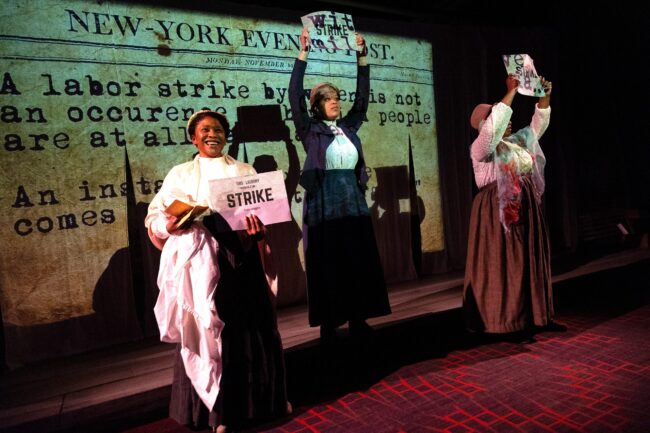“The Wash” tells the real-life story of the 1881 Atlanta washerwomen strike, during which Black laundresses led a strike for better wages in the weeks leading up to the International Cotton Exposition.
Americans are facing a precarious time in history due to many factors including the attack on women’s rights and affirmative action, the latter of which has targeted African American women with the recent Supreme Court decision against the Fearless Fund. This year’s Juneteenth and Fourth of July festivities conjure up a lot of historical memory and have Americans in general and African Americans specifically thinking about what freedom really means during a precarious time in our nation’s history. The play, “The Wash,” debuts just in time to give us some history and context through which to consider these issues.
Journalist-turned-playwright Kelundra Smith’s play, “The Wash,” examines the story of Black laundresses in Atlanta, who led a strike in 1881 for fare wages and demanded payment for services rendered. The Atlanta Washerwomen’s Strike of 1881 was the first successful interracial, organized labor strike of the post-Civil War era. “The Wash” offers an intimate and often funny look at ordinary women who accomplished extraordinary goals at a time when they did not have rights as Blacks or women. Smith’s play offers a peek into an important time in history, while highlighting how yesterday’s fight for freedom and equality resonates with today’s strife over the direction of our nation.

Photo: Casey Gardner Ford
Smith, an award-winning journalist and theatre critic, never had any desire to become a playwright, The Atlanta native attended the University of Georgia (UGA) for theatre and focused on acting and directing. After graduation, Smith moved into arts administration, higher education and journalism, so there really was no room for creative writing. This story about Black washerwomen really spoke to Smith, who had not heard of this story growing up in Atlanta, and knew it needed to be told. While she was comfortable with her journalistic work, playwrighting allowed Smith to work other muscles.
“Writing a play is a totally different process from journalism writing,” says Smith. “It uses a different part of my body. Playwriting requires my heart. Getting a magazine published requires my head. Both require a ton of collaboration and people skills,” acknowledges the self-described introvert who “cosplays as an extrovert.”
Although Smith used a different part of herself when writing the play, the nationally recognized theatre critic used her journalistic training to move the project forward. “You know when you pitch an article, the first thing any editor asks is what’s the hook? What’s the angle? Is it timely? I couldn’t explain the relevance of this story in 500 words, so it had to be more than an article” Smith offers. Being able to write this story also restored Smith’s appreciation for the process.
“For a long time, I felt really defeated by work,” confides the critic. “As a writer, I’ve spent most of my career being underpaid, overworked, and disrespected. I think this play helped me sort through how awful that made me feel and how to truly reorient my relationship to work,” she adds. Smith’s experiences with equality, fair pay and respect are on full display in, “The Wash,” which is brought to life by strong direction by Brenda Porter and outstanding performances by the cast. Smith praises Porter for casting performers Tanya Freeman, Nevaina, Kenadi Deal, Makallen Kelly, Charis Sellick and Jamila Turner, who give all of themselves to their roles. “Rachel May, the artistic director of Synchronicity Theater, says that the right people always end up in the room. These women are so individually talented. I have watched them become an ensemble. Iron sharpens iron.”
Such was the case with the production which went from a workshop that Hush Harbor Lab and Essential Theatre facilitated in Aug. 2022 to the stage in June 2024. “I had a month to do rewrites before we started a 3-week rehearsal process for a 7-week run. This cast is amazing. This show is labor intensive, and no one has missed a performance.”
Smith, who grew up in the church, enjoyed the process of getting the play from script to stage. “I enjoyed seeing the play be so appreciated and understood. One of my favorite Bible verses is Isaiah 55:11: ‘It will not return to me empty but will accomplish what I desire and achieve the purpose for which I sent it.’ I hope everyone who experiences this play feels full.”
“The Wash” opened at Atlanta’s Synchronicity Theatre in June and is set to take the stage at The Academy Theatre in Hapeville in a production from Impact Theatre Atlanta from July 11 through 28. The play is then scheduled to open in theaters in St. Louis and Chicago in 2025.
This feature was written by Nsenga K. Burton, Ph.D., founder & editor-in-chief of The Burton Wire. Follow Nsenga on social media @Ntellectual.
Follow The Burton Wire on social media @TheBurtonWireNews.







